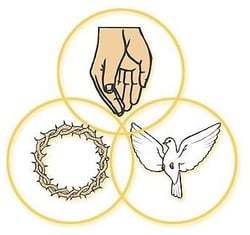
Do you ever think about the Trinity?
Does it matter in your everyday life?
The theologian, Karl Rahner, once wrote that most Christians operate as “mere monotheists” rather than living and believing as Trinitarians. His comment is thought-provoking. For one, when was the last time you said the word, “trinitarian"?
That is exactly his point!
Take a moment to ask yourself: If you decided to forget the Trinitarian nature of God -- Father, Son and Holy Spirit -- would much change in your life? It might not, but something would be missing.
While Church teaching on the Trinity has its roots in Scripture, it was formulated by the early Christian theologian Tertullian from clues in Scripture 200 hundred years after Jesus’ death. This later theological development is the foundation of our Christian faith because it communicates the nature of God: God is a community. The nature of God is relational.
Early theologians of the Church taught that the three unique persons within the Divine Life of God are at the same time made one and remain three by the very nature of that relationship. Divine love both unites them and maintains their integrity. Vatican II explains that in God, each person (Father, Son and Holy Spirit) is a loving gaze, perfect relationship, total gift (Lumen Gentium, 1-4). Each unique person gives of themselves completely in love but, doing so, does not lose themselves for they receive the same complete gift from the Other. In some sense, the giving and receiving that makes up the inner life of God models our lives in relationship with all humanity and with all creation.
On our path toward holiness, the Church is a community of believers who have heard this call and have committed themselves to make this unity a reality in themselves and in the whole human family (LG 1-4). When we are united in this way, we mirror and make present the ultimate unity existing in God who is both one and three. The early Church teachers used the Greek word, Perichoresis, to describe this Trinitarian activity and relationship within the Divine life of God. The word means "dancing."
The theology embedded in this ancient view is gaining popularity again among theologians and contemporary mystics because advances in human science are affirming the Trinitarian intuition: Reality is relational. In the Book of Genesis, God says, “Let us create humanity in our image, and in our likeness.” Human sciences suggest that the actual power that moves the universes from the smallest atoms and to the planets themselves is located in the relationships between these bodies. Or, in other words, in the dance itself.
This uniquely Christian understanding of God suggests humanity is invited into a participatory experience because God is a verb much more than a noun. The inner life of God is not remote or inaccessible. We have been given access through the person of Jesus Christ, the Second Person of the Trinity. Likewise, we are called to be sent---like Jesus---into the world to be in relation with it, to build unity, to bring others into this divine dance. If, as the Catholic theologian Catherine LaCugna writes, “The doctrine of the Trinity reminds us that in God there is neither hierarchy nor inequality, neither division nor competition, but only unity in love amid diversity,” then we are charged with a marvelous missionary mandate.
What does that mean?
Well, let's say the word, “Trinitarian” a few more times. They say if you use a word seven times it becomes a permanent part of your vocabulary. To make what the word means become a permanent part of our spirituality...participate, connect with your neighbors. Be a verb more than a noun. God is being in healthy relationship. This is the very nature of being – and the very image and likeness we are called to. The word and what it signifies means that a Catholic understanding of God is total diversity held in perfect union. Such a revelation should transform everything.
MISSIO offers themed-quizzes in MissioBot to examine your religious knowledge - and this blog by James Nagle, Ph.D to reflect on questions of faith.




